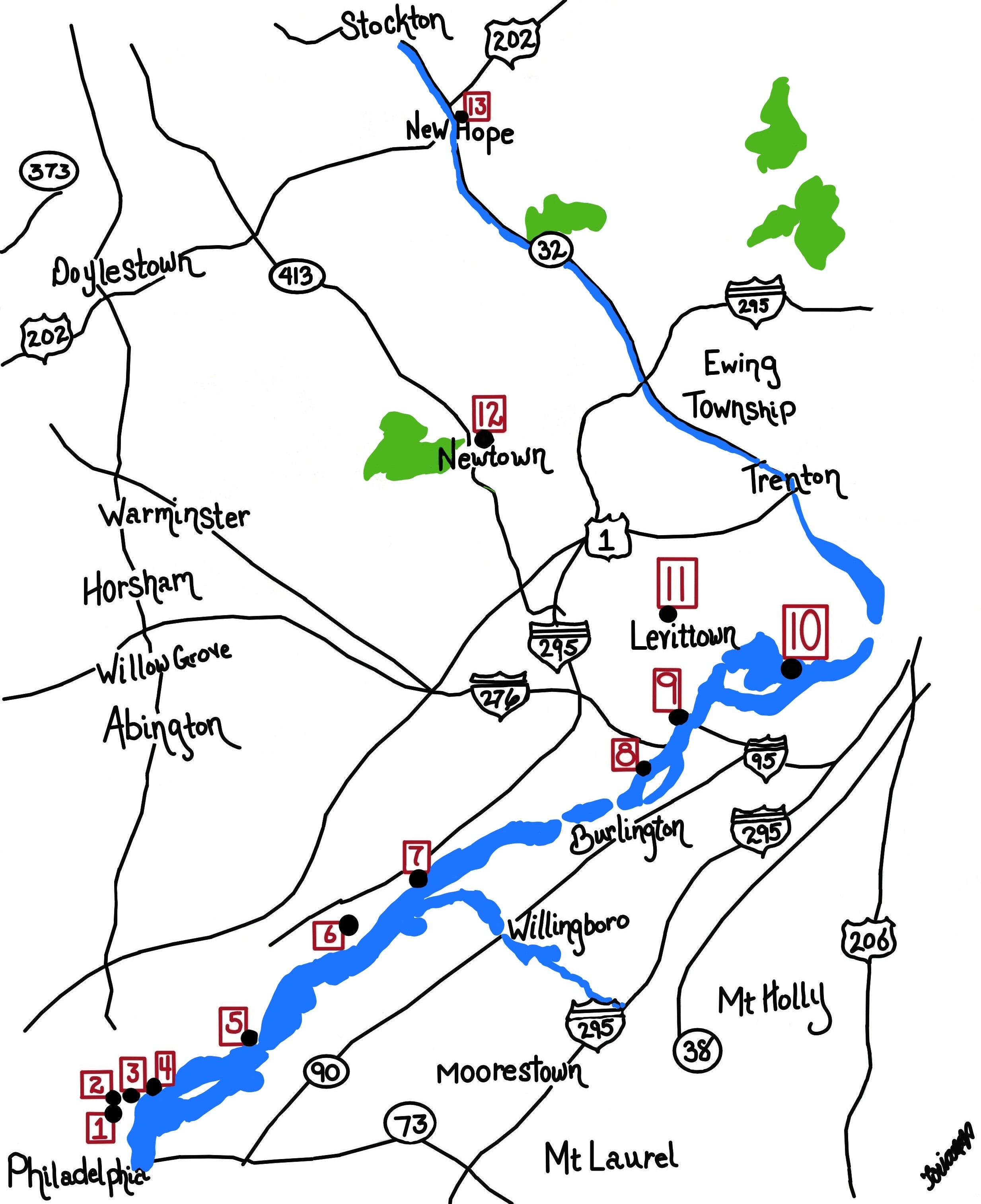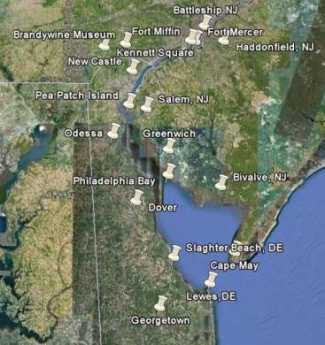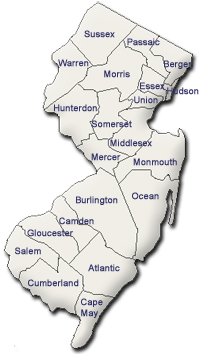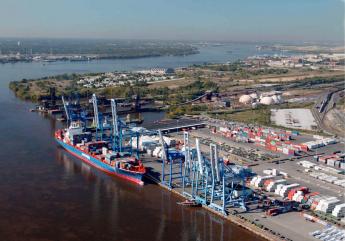Related Topics
Philadelphia's River Region
A concentration of articles around the rivers and wetland in and around Philadelphia, Pennsylvania.

Delaware (State of)
 Originally the "lower counties" of Pennsylvania, and thus one of three Quaker colonies founded by William Penn, Delaware has developed its own set of traditions and history.
Originally the "lower counties" of Pennsylvania, and thus one of three Quaker colonies founded by William Penn, Delaware has developed its own set of traditions and history.
Philadelphia Politics
Originally, politics had to do with the Proprietors, then the immigrants, then the King of England, then the establishment of the nation. Philadelphia first perfected the big-city political machine, which centers on bulk payments from utilities to the boss politician rather than small graft payments to individual office holders. More efficient that way.
City of Rivers and Rivulets
Philadelphia has always been defined by the waters that surround it.
Philadelphia Economics
economics
Land Tour Around Delaware Bay
 Start in Philadelphia, take two days to tour around Delaware Bay. Down the New Jersey side to Cape May, ferry over to Lewes, tour up to Dover and New Castle, visit Winterthur, Longwood Gardens, Brandywine Battlefield and art museum, then back to Philadelphia. Try it!
Start in Philadelphia, take two days to tour around Delaware Bay. Down the New Jersey side to Cape May, ferry over to Lewes, tour up to Dover and New Castle, visit Winterthur, Longwood Gardens, Brandywine Battlefield and art museum, then back to Philadelphia. Try it!
New Jersey (State of)
 The Garden State really has two different states of mind. The motto is Liberty and Prosperity.
The Garden State really has two different states of mind. The motto is Liberty and Prosperity.
Right Angle Club 2008
A report, to the year 2008 shareholders of the Right Angle Club of Philadelphia, by the outgoing president, Neale Bringhurst...
Port of Philadelphia

|
| Ports of Philadelphia |
When federal appropriations are doled out, it is a great advantage for the Port of Philadelphia to appeal to six U.S. Senators. However, the overlapping control of port operations can come close to paralysis. In short, we may have less chance of agreement on what we want -- but a greater chance of getting it. Right now, the ports of the world are struggling to adjust to revolutions of containerized cargo and gigantic oil tankers, plus political pressure from concern about the environment.
Some of the main arenas of our gladiator fights are as follows:
DRPA: The Delaware River Port Authority operates several large bridges, the PATCO high-speed subway line, and the cruise terminal, all leading to control of potentially large sources of revenue. The 1992 Congress expanded its charter to include the economic development of the port region.
SJPC: The South Jersey Port Corporation owns two marine terminals in Camden, and is planning a third in Paulsboro.
DSPC: The Delaware State Port Corporation operates the Port of Wilmington, DE.
PRPA: The Philadelphia Regional Port Authority has little to do with city politics, but is an arm of the state government of Pennsylvania, operating 7 marine cargo facilities, and planning more.
In addition, every county, city, and town along the riverbank has some degree of authority. Every business and union involved in regional or international trade is desperate to protect its interest in the politics of port regulation. Lately, the Homeland Security Agency has taken a large role. Scientists, engineers, fishermen, oil refinery operators, economists, and others abound. The news media convey their own opinions and the opinions of others. Opinions abound because most issues about ports are important.
In addition to the traditional cargoes of coal, petroleum, iron ore and forest products, which are mostly declining in importance, the rising cargoes include meat, cocoa beans, and South American fruit. General, or casual, cargo tends to be more valuable than bulk cargo, but greatly complicates the Homeland Security risks. The ratio of imports to exports is important because it is expensive to have a ship return empty. Shippers will, therefore, favor a port where there are expectations of return cargo. Oil tankers are particularly likely to return empty since their ballast is mostly river water; but, who knows, perhaps global warming will make dirty river water seem valuable to some tropical oil producer. A quirky problem is that most of the crude oil entering East Coast ports are currently coming from Nigeria, a notoriously corrupt nation. This has led to a thriving business of car-jacking in the Philadelphia suburbs, with the stolen cars promptly packed in empty containers returning to Africa.
Of the 360 major American ports, the Delaware River ranks second in total tonnage shipped, and eighth in the dollar value of the cargo. Every year, 2600 ships call into our port, which claims to employ 75,000 people. According to Bill McLaughlin of the PRPA, the future of the port will depend on the settlement of three major disputes:
1. Deepening the Channel. The historical natural level of the river is 17 feet, artificially deepened to 40 feet up to the level of the Walt Whitman Bridge. It sludges up by two or three feet every few years, so dredging is a continuous issue. The enlargement of tankers and container ships has led to a need to deepen the channel to 45 feet. It is true that the Wissahickon schist pokes up at Marcus Hook and will have to be blasted out, but mainly the issue is dredging up the gunk on the river bottom, and hauling it away somewhere. In Delaware Bay below Pea Patch Island, the bottom is sandy and hence valuable. The State of Delaware has plans for riverfront development, and would actually like to have the 8 million tons of sand, so no problem. The 7 million tons of clay and silt which must be dredged out of the upper Delaware River channel for a 45-foot depth is more of a problem, but users can be found for most of it. Or so the Pennsylvania representatives maintain; the New Jersey representatives led by Congressman Rob Andrews say it would be an environmental disaster to dump a thimbleful on New Jersey. Feelings get pretty hot in these things. The Haddonfield representative is portrayed as selling out his district in order to further his own state-wide aspirations, acting on the orders of North Jersey politicians who dominate New Jersey politics, who want to lessen competition with the Port of New York, which also shares a border with New Jersey. Feelings are not soothed to see the Port of New York deepening its channel to fifty feet while resisting forty-five in the Delaware port.
The document currently at the center of this interstate dispute is called PCA, the Project Cooperation Agreement. New Jersey won't agree to sign the proposal, which contains clauses to remove the DRPA from authority and replace it with PRPA(essentially transferring control and revenues from Philadelphia to the State of Pennsylvania) as the "non-federal sponsor". PRPA would then enter into a contract with the Army Corps of Engineers to get the work done.The price, probably low-balled, is $219 million, to be compared with the Port of New York's dredging price (probably high-balled) of $50 billion. There are, of course, a great many features of this political negotiation which are unlikely to appear in print.
2. Southport. The grand plan for the Philadelphia Port is to center on an intermodal complex of piers, railroads, and highways which would extend as a continuous terminal from the Walt Whitman Bridge to the old Naval Yard. No doubt this idea is linked to the round-the-world concept of Philadelphia as a way station from India to Vancouver, overcoming the empty return cargo problem by never looking back. Good luck.
3. Monetizing the Port. Like the turnpikes, ports could be sold to private investors. Of course, that could extend to selling the property to foreign investors, triggering the nationalist reaction readily observed when port management was once offered to Abu Dahbi. It could well give a new meaning to the expression, being sold down the river, but who knows maybe it's a good idea. When you criticize motives it never bothers real political pros, because it's simple to say you don't have such motives, and who knows. But the people seriously involved in government finances say they most fear that the do-gooders will be allowed to sell or lease publicly-owned facilities to improve the financial balance sheet. And then the pros will just take the money and use it to pay interest on more borrowing.
WWW.Philadelphia-Reflections.com/blog/1337.htm
Originally published: Tuesday, November 20, 2007; most-recently modified: Friday, May 31, 2019
| Posted by: Molly | Feb 24, 2014 7:08 PM |